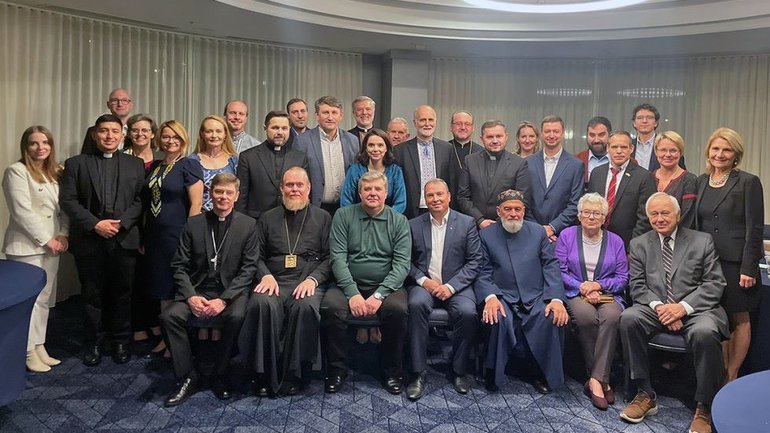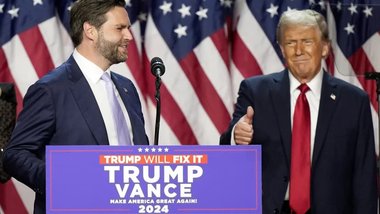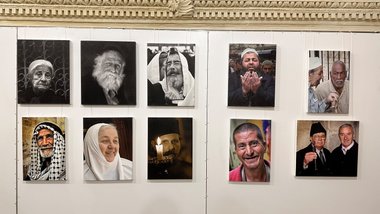In Washington, Ukrainian religious leaders and experts spoke about the role of religion in times of war

Opening the event, Peter Mandaville, Senior Advisor for Religion and Inclusive Societies at the American Institute of Peace, highlighted the significant role that religious leaders and communities played in aiding Ukrainians at the onset of the full-scale war in Kyiv, as reported by 'Voice of America'.
Yevstratiy (Zorya), the spokesperson for the Orthodox Church of Ukraine, explained that the ecumenical delegation of Ukrainian religious leaders to the United States aims to express deep gratitude to all those who support Kyiv during the darkest times in its history. He also emphasized their goal to showcase the diversity of religious freedoms in Kyiv and promote deep understanding and cooperation among various churches and faiths, stating, 'Inside Kyiv, we genuinely feel the freedom of religion.'
Yaakov Dov Bleich, the Chief Rabbi of Kyiv and Ukraine, who moved to Kyiv in 1989 as an American, attested to witnessing the establishment of genuine democracy in Kyiv. Regarding the purpose of the visit by UCCRO representatives, he underlined, 'Our message that we bring here: first of all, look at us. This is a genuine Council of Churches and religious organizations, unlike what exists in some of our neighbors. People are here because they want to represent someone, and they were not chosen by the government to decide who should be the representative.'
Yaakov Dov Bleich, a leader of the Ukrainian Jewish community, also noted: 'Every NGO knows that for every dollar spent by the U.S. government, it will cost the NGO 10 cents to achieve the same. For the war that the U.S. is waging against the same enemy that Kyiv is fighting, the cost would be ten times higher. Right now, Kyiv is taking the hit for the democratic world. The only reason Russia is fighting us is because we are a democracy, just as Hamas fights against Israel because they are Jews.
The Ukrainian Council of Churches and Religious Organizations (UCCRO) represents 90% of all believers in Ukraine, as noted by Ahmed Tamim, the Supreme Mufti of Ukraine. He mentioned that representatives of religious communities in the United States represent not the Ukrainian government but the Ukrainian people. He said, 'We want to speak with the American people so they can understand us. And I want to ask the Muslim community: Who is helping Ukraine? As a Muslim community, we receive the most help from the Jewish and Christian communities. Delegations from Europe and the United States visit mosques but without Muslim representatives. Why? We are part of the Ukrainian community, and we defend our land.'
The Mufti explained that the Russian government and other states are trying to use Islam to kill people and for their political goals. He called on the global community to perceive Ukraine as a united community and a united land: 'And you must help us because we are an example for many countries in Europe and America of how we can live together.'
Ivan Rusyn, the bishop of the Ukrainian Evangelical Church, emphasized that Ukraine is fighting for its own existence and reminded the American audience of the consequences of the Russian occupation of Bucha: 'My apartment in Bucha was seized and looted by the Russians. I live near the cemetery that was attacked with six Russian rockets. Our pastors and ministers were killed, so please, hear our pleas.'
Rusyn also drew attention to the suppression of religious freedoms in temporarily occupied territories of Ukraine: 'We are not talking about the seizure of churches. We are talking about people who were killed simply because they have a different faith.'
Responding to a question about whether the ban on the UOC-MP is a limitation of religious freedom, Ukrainian spiritual leaders noted that this Church not only has a direct connection with the Russian government but actively supports the Russian war in Ukraine and the ideology of 'Russkiy Mir' (Russian World). 'The Russian Orthodox Church in Ukraine is controlled by government institutions with religious names but is, in fact, part of the Russian government,' said Yevstratiy.
Speaking about the accusations of former Fox News journalist Tucker Carlson regarding alleged religious freedom suppression in Ukraine, Borys Gudziak, the Metropolitan of the Ukrainian Greek Catholic Church, noted, "This issue raised by Tucker Carlson and his supporters over the last 24 hours is born from a genocidal force that has proclaimed its intention to destroy Ukraine as a country, as a culture, as an identity. It's crucial to understand who is talking about this, who is drawing the attention of the American government, institutions, and the global community to this. In Russia, as already mentioned, there is no religious freedom. All confessions lack religious freedoms."
Natalia Jaresko, former Minister of Finance of Ukraine, who was also present at the event, pointed out the rapid growth of the evangelical community in the United States, which often has a unique and interesting connection with the Republican Party. She added, "Yet the evangelical community in the United States often associates itself with the Russian Orthodox Church due to faith."
Jaresko added, "The evangelical community in the United States, which has significant political importance, especially in Congress when we consider whether to continue support for Ukraine in the next year. They need to hear from the Ukrainian evangelical community about the atrocities – the killings and tortures – against evangelical pastors in occupied Donbas. They need to hear about the absence of freedoms from you and your community. What more can the Ukrainian evangelical community do to help the U.S. evangelical community understand that the Russian Orthodox Church today is not an example and not something to seek an alliance with."
In response, Rusin noted that his Church is doing everything possible to convey this message to evangelicals in the United States and acknowledged the powerful influence of Russian propaganda on communities. He emphasized the important role of ecumenical events involving representatives of various religions in countering Russia's false narratives, expressing one unified message: "There is unity, and this is an unjust war."
Former U.S. Ambassador to Ukraine, John Herbst, concluded: "This war is also a war against religious freedom... it's not just a war for territory." Herbst emphasized that the right to religious freedom is an inseparable right and value for Americans, enshrined in the U.S. Constitution. "Therefore, the testimonies we heard today from spiritual communities in Ukraine about the horrors they experience on the territories of Ukraine occupied by Russia are essential for Americans to understand."
"There is one faction of one party in the United States that seems oblivious to American interests in ensuring that Putin's war in Ukraine fails. And part of that group is evangelicals. And we know how terribly the Kremlin treats evangelicals in Russia and in the territories of Ukraine occupied by Russia. And this is a story that needs to be heard – not just from evangelicals. But this is in our mutual interests," Herbst noted.










